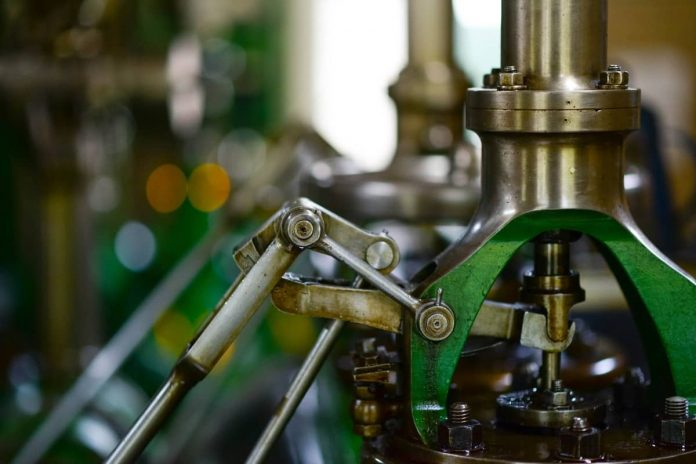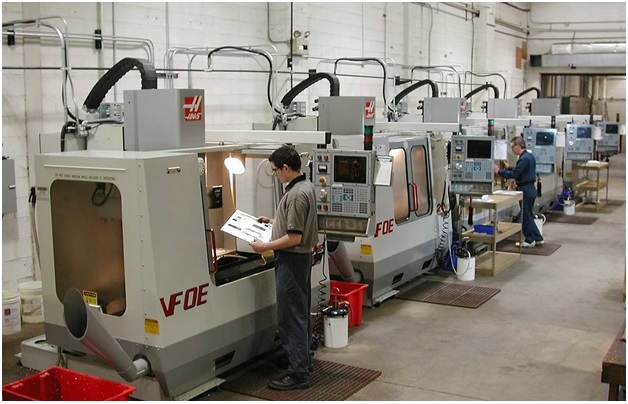A machine shop is a place, which can be a building or room, where machining is done. Machining in itself is any process where pieces of raw materials are cut into desired shapes, sizes and specifications using a process of controlled removal.
Most of these processes use a method which is referred to as subtractive manufacturing. There is also the method of additive manufacturing where materials are added in a controlled way.
The controlled part in these definitions can vary though a lot of the time it suggests using machine, power, and hand tools to achieve the desired end product. You can read about this here.
The use of metal is very common in machining though other materials such as plastic, wood, composites, and ceramics may also be used.
Most modern-day machine shops now use Computer Numerical Control (CNC) and various computer programs to produce these parts in a short amount of time and with a high level of precision.
This is also helps to reduce labor costs and increase efficiency as the CNC machines can run unmanned. People who specialize in machining are referred to as machinist.
Machinists in a machine shop use cutting and machine tools for making parts for machines and devices.
These may often be prototypes. These parts can either be the machine shop’s finished products to be sold to their clients or it can be custom made to their client’s specific needs.
Common Tools in a ITAR Machine Shop
Producing parts consists of cutting, drilling, shaping, finishing, etc. with machines tools like:
- Metal lathes
- Drill presses
- Milling machines
- CNC
- Multitasking machines
- Welding machines
- Inspection equipment
Other processes such as painting, heat treatment, or electroplating of the parts may also be employed either before or after machining. The shop also contains raw materials that are required for manufacturing. An example will be bar stock.
Some common industries served by these shops include automotive, aerospace, shipbuilding, and power generation industries.
What is ITAR and Why Do Machines Shops Need to be Certified?
For manufacturing companies, most times, they need an International Traffic in Arms Regulations (ITAR) certification to operate when they have projects request for articles that fall under ITAR classifications.
ITAR laws are export control measures and regulations by the Department of State (DOS) in the United State. These regulations are used to control items on U.S Munitions List or the Missile Technology Control Regime and it applies to things that are defense-related or for military use.
Machine shops who want to take up jobs under ITAR classification must show and prove that they are ITAR compliant.
Manufacturers may have ITAR zones where they only make ITAR listed parts and workers may require a badge to access the zone due to ITAR requirements.This is so as not to allow foreigners to access data, information, or products produced there.
For machines shops that speedily produce parts and in large volumes, having a separate section or zone for ITAR specification may not be feasible.Instead, they treat their whole manufacturing setup as falling under ITAR classification, getting certification for the whole operation.
The advantage of being ITAR certified is that you can work with and make products and parts for other non ITAR certified companies.These may demand a set of quality standards and assurances so that they do not run into trouble themselves with the DOS.
Secondly, if there is a fault in manufacturing caused bya part milled by a machine shop, they can trace where the fault is from easily even down to the material lot the metal is made from.
What Are the Qualities of a Professional Precision Machine Shop?
If the success of your business depends on getting strong, reliable, and durable parts,then you should choose a machining company that has the qualities to help meet your objectives.
A good machining company will be able to engineer your parts to your specifications with great precision. Some of the characteristics you should look for when selecting such a business include the following:
#1. Advanced, Quality and Varied Machines
One of the first things to check when choosing a machining company is the range, quality, and how advanced their machines are. They should have top quality, modern machines that can handle your project.
They should also have different selections of machines that can handle different types of projects as well as those that will help them deliver quick turn machining and turning, ensuring that jobs can be delivered a lot faster.
A top shop will be well-informed regarding the latest tools, materials as well as developments in their field that impact on the quality of their delivery. Shops with these kinds of tools and capabilities show that they are seriously about serving their customers well.
#2. Quality and Standards
A good precision shop will have formal certifications such as the ITAR mention above and others. With this, they can prove that they follow and uphold quality standards.
They should be proud to show and display previous samples of work they have done on similar projects. They will have systems in place to check the quality of parts produced and their whole process even up to delivery.
A good precision shop will also undergo regular audits and ensure that they transparently conduct their business; being able to tell the kinds of machines and techniques they have and use, the materials they can work with and also the tolerance and outputs they can accomplish.
#3. Good Communication and Great Customer Service
Poor communication can be a problem when producing parts to specification. A good precision company will have good representatives that are smart, knowledgeable, and professional, with the ability to communicate effectively and understand what their customers need.
Their customer representatives must also possess interpersonal skills to relate with and help customers with turning their designs to finished products rapidly.
#4. Safety
For precision shops, safety should be at the forefront of whatever they do. They should follow best practices and ensure the safety of their workers and anyone around the premises.
Conclusion
The above are just some of the characteristics and competences a machine shop should have. Others include experience, reliability, expertise, good reviews, and maintenance. You will do well to watch out for these when selecting so you can get reliable parts for your business.
For More Home Decor NEWS and “ITAR Certified Machine Shop“, Visit CRECSO NEWS Magazine. Follow us on Facebook, Instagram, and Subscribe for Daily Updates To Your Mail Box.
















